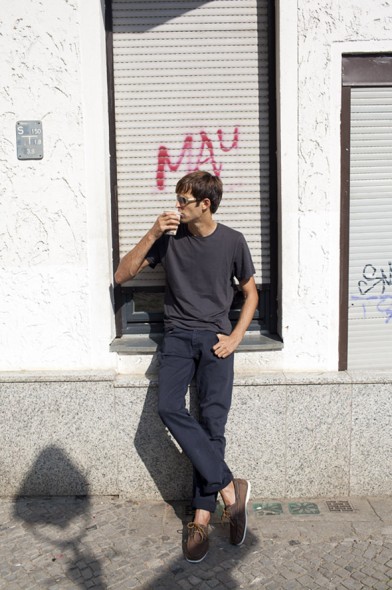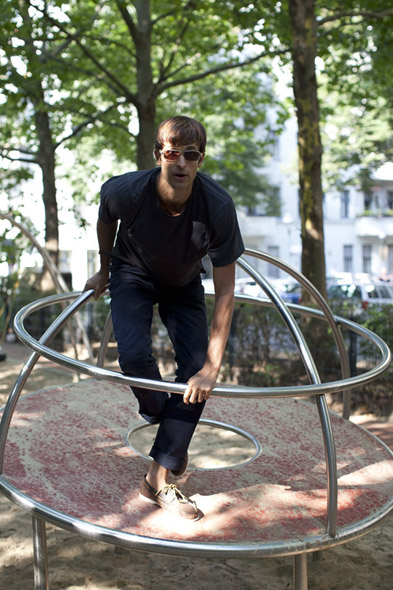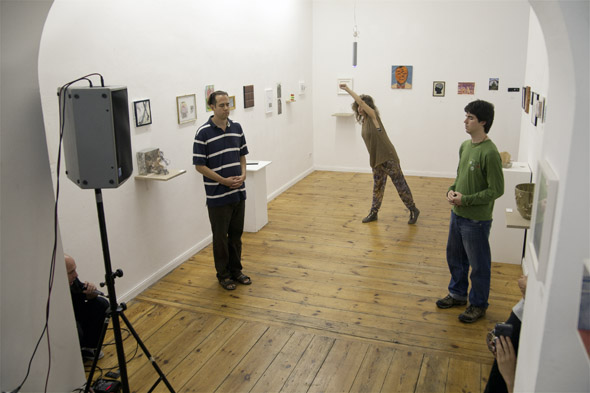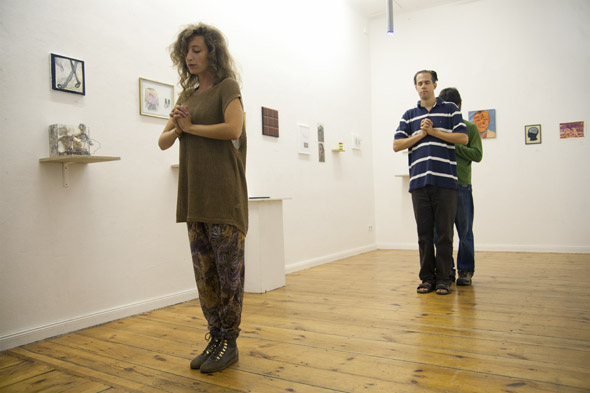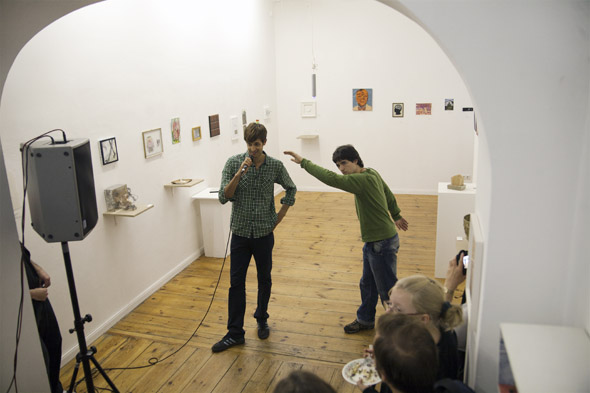by Daniel Thomas Berg, photos by Chloé Richard // Aug. 25, 2011
The COT Theater is an improvisation performance collective founded in London by director and former art critic Max Ray and visual artist/physical performer Satu Suomela. Their shows revolve around improvisation and an interdisciplinary approach. Productions often include live music, DJs, performance film and photography, acrobatics, and a strong focus on audience participation and humorous interpretation.
The COT is currently based in Berlin, and holds theater workshops in Neukölln. I sat down with Max in a café near Hermannplatz to talk about their approach to theater. He is tall and sinewy, and dresses in an understated, devil-may-care manner. At first glance you might be tempted to dismiss him as yet another one of the multitudes of bohemians inhabiting our city. But when he’s talking about theater his eyes light up dramatically, and it seems like he is trying to keep up an uneasy balance between the words and his racing thoughts. He talks fast and with fluency, what would sound arrogant in a tone laced with ennui becomes engrossing and informative; his energy is contagious. It becomes obvious then that he is one of the few blessed ones who truly love what they’re doing and wouldn’t want to do anything else.
DANIEL THOMAS BERG: Berlin has a pretty expansive artistic population and multiculturalism. Your group performs in English, and you have a lot of expatriate members. How does this affect your work?
MAX RAY: We have predominantly non-native English speakers. It’s been shaping up to be like this in the workshops we run as well, and we now have people from 25 different countries: I was born in Israel and Satu is Finnish. We’ve had improvisers from Haiti to Argentina, Germany to the US. It’s exciting to see scenes being performed by people from such different backgrounds, not only from different cultures and nationalities but also with different levels of experience. We try to recreate that on stage, incorporate it into our rehearsals, and I think it makes it much richer in a way.
Do you find that people bring a lot of cultural connotations into the way their work, the way they perform?
Absolutely. You can see it a lot of times starting already with body language. The way you use your hands when you speak, the vocal pitch, the kinds of facial expressions, how the body reacts. You can start seeing degrees of inclination to lean forward or back when you want to signify rejection, love, anger.
And those are culturally varying symbols?
I think so. When you have an experience with a new culture you start becoming aware of these kinds of visual cues. Culture is dominant with people, for me even more so than heredity. I don’t think it’s a genetic imprint that defines who you are as much as where you grew up, how you learned to use your body, your voice, communicate with others.
So in the nature vs. nurture argument you’re a nurture guy?
I guess it comes from traveling. I’ve lived all over the world in the last couple of decades, and the way I see it culture informs our movement as well as our way of thinking. The public discourse does that, norms and expectations, gender roles, all of that.
Would you say your experience in Berlin has been different?
Berlin is a village-sized metropolis in a way, you know?
Not as sprawling as New York or monumental as Paris…
I used to live in the East Village for many years. I see a lot of similarities. Then again, you can’t just hop a car and go to Midtown because there is no real Midtown. It is a real multi cultural metropolis, but it’s much more confined, it’s much smaller and people get to know each other quicker, which is a cool thing.
We’ve talked a bit about the way you incorporate technology and this new digital life into your work with the COT. How has the digitalization of our culture affected theater as a whole?
I think there are two different ways to look at it. On one hand, there’s a total embracing of digital means, which is not the norm. There are a lot of companies out there that still work like it’s 50 years back.
The “Traditionalist” viewpoint?
The groups that I like make use of what’s really changing the way we live. I think the digitalization of the world has helped some theater groups realize that they don’t necessarily have to use technical devices to assist their work, but rather embrace this general spirit of innovation. One of the performances of Les Ballets C de la B I saw when I was working as a critic in the UK incorporated opera, acrobatics, modern dance, African dance, a small scale symphony orchestra. Multi-disciplined work had always existed but I think the digitalization of our society shows you that you can break the rules as far as what’s ok to do, what’s possible for you to do. Same way as you can now self-publish albums, make a production over Skype, shoot files across the world you can also break these old barriers betweens disciplines. Satu is a physical performer and choreographer – one of her last projects was an improvised dance piece for this year’s Transmediale Festival, for example – and we’ve had performers who come from television, playback theater, poetry; all of these disciplines combined and informing one devised production. The digital aspect is another prism through which you can look at modern society. In one show we got an audience member to give us a peek into his digital existence, through Facebook and text messages, and we envisioned this world for him, we built it for him on stage, had him sit on the side and give us input as we went along. With the assistance of sound, light, movement and non-verbal communication the stories, this whole digital world, took shape in front of him. We actually discovered someone in the audience who had a connection to someone in his FB network. It really became a whole audience bringing their life on stage, creating what actually exists in their digital sphere, re-imagining it.
A social network play?
You start to see that with this whole new digital-physical coexistence there is something new developing. Some people mock it, ask if we are interested in being human anymore or are we just interested in virtual existence? In a way that’s super old fashioned. The world around us is changing all the time, and people in the 50s also must have looked back at the 20’s and said this is crazy, what’s happening today? But it’s a natural trajectory in the human quest to get better, to grow and explore.
Theater by definition is ephemeral, a product of the times. Film and theater is at its best a reflection of the current state of culture and society.
At it’s best it is a reflection of the current state of culture and society. The plays that remain popular are still the ones that feel relevant. Like Brecht writing about non-European cultures and making them feel both very unique and universal at the same time. With improvisation, which is the core of what we do, you have to reflect reality, even if you depict imaginary situations, or do it in a totally abstract, absurd or surreal way. As long as you try to keep your eyes open, so to speak, and be true to the moment, you will tap into something truthful. When you’re trying to impose preconceived ideas it feels fake, to you as a performer and to the audience.
A lot of people say the reason experimental theater (like other avant-garde art movements) developed is to address a general cultural crisis. Do you feel that by doing things in a non-traditional way you are confronting a crisis in culture?
There isn’t one “crisis” per se, that would be oversimplifying the world we live in, to choose a phenomenon and call it an X-Y-Z conflict. There is conflict and crisis everywhere. But you could say that global crisis such as Wars or natural disasters become more personal nowadays, with constant coverage and even personal accounts posted online by friends from different countries. Large or small, everyone has at least a couple of ongoing personal crises in their life. There’s always different factors pulling to different directions, there’s always tension. Even the digitalization we spoke of is a crisis for many people, a social one. The ways we make human connections are really different than they used to be. I meet somebody, many times I leave without their phone number, which would be unheard of a few years ago: I just have their name, their Facebook. I go home and they would add me, I would add them, and you think “OK, I’ve done my part now.” He’s there; he’s in my archive, my circle of friends. Two years go by, the guy’s gone to a different country and you’ve never met because there is this virtual assurance that they are there. That disconnects you from life, which is in a way a crisis. But in a way, accepting these changes is a must in order to be able to negotiate them.
So is the essence of experimental art to respond to these kinds of conflicts?
Experimental art is only called experimental for the first few years, until its adopted by everybody else as the way to move forward. And yes, perhaps all groundbreaking works of art are a response to a crisis. Why is Brecht regarded as a more or less a “classical” playwright when in his time he was deported and his plays burned? Even Madonna was experimental at first. Probably the biggest over the top commercial artist used to be an edgy provocateur when they started out. It’s really just semantics, and how society creates and perceives trends. At the end of the day there’s the people producing a creative effort and people reacting to it. I think that’s more significant than the label.
I wanted to ask you about labels and labeling specifically. Depending on whom you ask experimental theater means a lot of different things. Some people use it positively, others pejoratively. Even beyond that you’ll have different definitions. What does it mean for you?
The experimental label is a very interesting one. For us it goes back to improvisation. With improv you are constantly seeking to be in the moment, to let go of the ideas and notions you bring with you into the rehearsal space. You’re trying to let go, and when you are able to do that you are letting go of your own ego and fear. There’s only way to reach that stage: trust. If you can develop that trust then you’re really in new territory. You’ve done away with your tried and tested gimmicks as a performer, and you’re really just exploring what’s there, how the audience is reacting, where the music is going. We’ve had people silent on stage for twenty minutes, hardly any movement, and it was fascinating. Another way is to go to a place where people are expecting to see comedy and give them comedy, which if you turn off the laugh track is not comedy but avant-garde. I think that’s an experiment, playing with genres, and with minimalism. Look at Aki Kaurismäki’s La Vie Boheme. He filmed in Paris, all in French, with Finnish actors who could not speak French. That’s for me is intensely experimental. He basically fed his actors the lines in a language they do not have an immediate connection to and had them play it. That fits with his minimalist approach to filmmaking. The boundary between experimental and mainstream is not that defined really, so I do think this particular label is a shell. Many times a very slight tweak can make things experimental, and for some people it’s very hard to take.
Author Info
Daniel Thomas Berg studied theater and art history in New York. Originally from Brooklyn, he has traveled extensively and lived in four hemispheres. Having worked with various traveling experimental theater troupes, both as a performer and director, he has an avid interest in developing technologies and their implications for the arts. Daniel currently lives in Neukölln, Berlin.
Photographer Info
Chloé Richard is a globe-trotting French photographer who has called Berlin home for the past 2 years. Her portrait work has been seen in L’uomo Vogue, Nylon magazine and Dazed Digital among others. She is a regular Berlin Art Link contributor, and one of the main photographers featured in the Berlin Fashionweek Photodiary, whose 2nd edition comes out in September.


